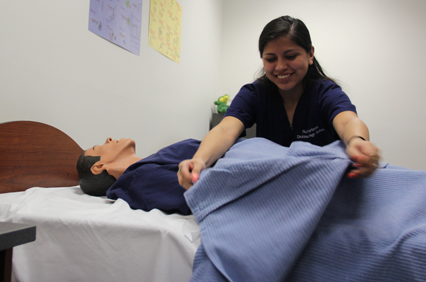Enroll in health care courses to fast-track to workforce

As the U.S. population ages and technology advances, health care is increasingly a solid career choice with good salaries and career opportunities. Enter the workforce in often less than a year with a COM certificate program.
Dental Assistant
Prepare for an entry-level position in one of the fastest growing fields with COM’s Dental Assistant Program.
A varied role, dental assistants’ work can include assisting dentists conducting dental procedures, managing equipment and x-rays, patient assistance and recordkeeping.
Training includes 16 hours of clinical lab experience and a five-hour Health Care Provider CPR certification course.
Through labs and classroom instruction, students will prepare to take the state certification exam and succeed in the workplace.
This class runs Sept. 21 to Dec. 16, Mondays and Wednesdays, 6-9 p.m. Students may qualify for financial aid.
To learn more, call 409-933-8645 or 281-332-1800, or visit www.com.edu/ce.
ECG Technician
Learn to monitor heartbeats and their patterns as an electrocardiography (ECG) technician in COM’s one-semester program. ECG technicians conduct ECGs and view, document and interpret the results.
Established in 2010 and offered through the college's Continuing Education-Allied Health program, the 60-hour course introduces students to cardiovascular anatomy and physiology, electrocardiography procedures and interpretation of basic dysrhythmias. Students learn about the different medications used for heart dysrhythmias, how they affect the heart and other problems they may create.
Upon completing the program and passing the certification exam, students are qualified to obtain employment at hospitals, physicians' offices and medical and diagnostic laboratories, good news for an industry the Bureau of Labor Statistics predicts will grow 29 percent in the next ten years. Their average hourly wage is $15.67.
The class is Sept. 15 to Nov. 24, Tuesday and Thursday from 6-10 p.m.
In-district tuition is $585, and students may qualify for financial aid.
To learn more, call 409-933-8645 or 281-332-1800, or visit www.com.edu/ce.
Phlebotomy
Prepare for a rewarding career in health care with College of the Mainland’s one-semester phlebotomy technician program, now enrolling.
COM’s program trains students in small classes and hands-on labs to safely and smoothly draw blood. Students perform clinicals at facilities such as University of Texas Medical Branch.
The mean hourly wage for phlebotomy technicians is $14.53, according the Bureau of Labor Statistics. The need for phlebotomy technicians is projected to grow 13 percent by 2020.
Graduates last year earned a 100 percent pass rate on the national exam. The program prepares students to work as a phlebotomist or continue with training in the certified nurse assistant or patient care technician programs.
Students must have a high school diploma or GED, but do not need to take the SAT or other placement exams.
The class begins Sept. 15. Students may qualify for financial aid.
To learn more, call 409-933-8645 or 281-332-1800, or visit www.com.edu/ce.
Certified Nurse Aide
A vital part of the health care field, certified nurse aides provide compassionate basic care for patients. The demand for certified nurse aides is projected to increase 20 percent by 2020.
Through hands-on classes, labs and practicum at a health care facility, students train to assist patients of hospitals and long-term care facilities with daily activities. The program prepares the student for the state licensure exam.
The class begins Sept. 14, Monday and Wednesday, 5-9 p.m. Another class begins Oct. 20, Tuesday and Thursday, 6-10 p.m. at the COM Learning Center-North County in League City.
Students may qualify for financial aid.
To learn more, call 409-933-8645 or 281-332-1800, or visit www.com.edu/ce.
Medication Aide
They give medications and compassion. Through labs and classroom instruction, the College of the Mainland Medication Aide Program trains students to work in long-term care facility and skilled nursing facilities.
Students learn to administer medicine by mouth, by cream or by eye drops. Those who are certified nurse assistants and looking to expand their skills can train quickly to become certified medication aides.
Students can use the program as a stepping-stone to further education or to land a promotion at their current place of employment.
Certified medication aides earn $3-4 more per hour than certified nurse aides, plus it helps them continue their education to become a licensed vocational nurse or registered nurse. The COM program prepares students to pass the written state certification exam and follows curriculum established by the Department of Aging and Disability Services.
The class begins Sept. 21. Financial aid may be available for students who qualify.
To learn more, call 409-933-8645 or 281-332-1800, or visit www.com.edu/ce.
